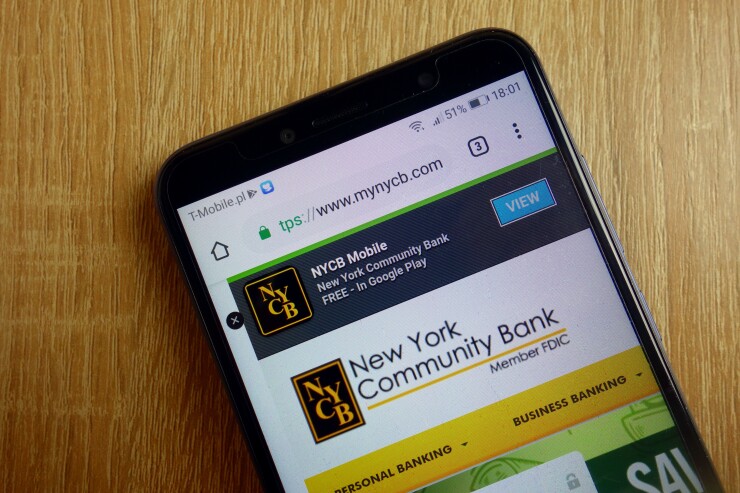
New York Community Bancorp's shares sank 37% on Wednesday as the Long Island-based regional bank recorded a sizable quarterly loss, reported troubles in its commercial real estate portfolios and slashed its dividend.
Investors were caught off guard by the bank's earnings report, which revealed a series of moves the company took in preparation for
New York Community charged off two large real-estate loans — one on an office building and the other on a multifamily property — last quarter. It also stashed away a big chunk of money in case other borrowers go into default, which contributed to a net loss of $260 million during the fourth quarter. The company slashed its dividend to five cents per share, down from 17 cents.
"We recognize the importance and impact of the dividend reduction on all of our stockholders and it was not made lightly," the bank's CEO, Thomas Cangemi, said in a news release.
Investors sold off New York Community's stock, which fell 37% to $6.47 at the end of the day.
Jon Arfstrom, an analyst at RBC Capital Markets, described the dividend cut as "highly unusual," writing that it came without "any type of warning for investors." The reasons New York Community gave for its moves are all "viable," he wrote in a note to clients, but their suddenness was a complete surprise.
"These trends and decisions were not expected at all," Arfstrom wrote.
New York Community charged off about $185 million of loans during the quarter, thanks largely to the two real-estate loans.
One was a so-called "co-op" loan on a multifamily building that was facing trouble but not in default. Bank executives plan to sell the loan this quarter, and they said their broader review of co-op loans didn't turn up others with "similar characteristics."
"We're still very comfortable in the quality of the multifamily portfolio," John Pinto, the company's chief financial officer, told analysts during the company's fourth-quarter earnings call.
The second charged-off real-estate loan involved an office building that started facing trouble last year and got a lower valuation.
New York Community's loan portfolio has been facing scrutiny in recent months, due primarily to its exposure to office loans and multifamily loans in rent-stabilized buildings — two parts of the real-estate market that have drawn concern.
As of Dec. 31, New York Community's multifamily loans totaled $37.2 billion, or 44% of its total loan book, according to the company's earnings supplement. Total office loans were much smaller — about $3.4 billion at the end of December.
Cangemi said the dividend cut will help the company boost its capital cushion — a key consideration since its asset size is now above $100 billion, which will cause it to be subject to several tougher regulatory rules.
New York Community's
Crossing over the $100 billion-asset mark means that regulators will now oversee New York Community as a so-called "Category IV" bank, subjecting it to a series of tougher standards, including periodic stress tests and heightened capital requirements.
Cangemi said the Signature deal, which
"We believe this is the prudent decision as it will allow us to accelerate the building of capital to support our balance sheet as a Category IV bank," he said in the news release.
David Rochester, an analyst at Compass Point Research & Trading, wrote in a note to clients that it's "more likely than not" that the building of capital was a one-time event, as New York Community prepares its balance sheet to look more like larger banks.
In a separate research note, Autonomous Research analyst David Smith said the bank's earnings call Wednesday was "painful … as the bank continues to adjust to its new regulatory status."
"Management tried to cast a positive picture for New York Community's longer-term prospects, but the near term picture looks very challenging," he wrote.
One portion of the call was particularly testy. Steven Alexopoulos, an analyst at JPMorgan Chase, pressed the bank on why its guidance for 2024 did not include a projection of its net interest income.
"Why don't just give us the number and make life easy?" Alexopoulos asked, saying it'd be helpful "so we're not all guessing and maybe your stock won't trade down to $7."
He added: "I can't imagine you're happy with this. … I don't know why you wouldn't take this opportunity to level-set expectations."
After the markets closed Wednesday, New York Community updated its investor presentation to include that number. It expects net interest income to be between $2.8 billion to $2.9 billion this year, down from $3.1 billion in 2023.
New York Community executives also said Wednesday that they've decided to push back the Signature systems conversion, which had been expected to happen this year, to 2025. The goal, they said, is to avoid customer disruptions and minimize expenses as New York Community finalizes the Flagstar integration.
The Flagstar conversion is scheduled to happen in mid-February 2024, Cangemi said on the call.






